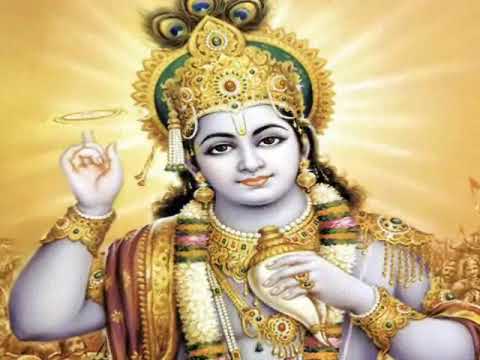Moksha Sanyasa Yoga Part 1 – BhagavadGita in Sanskrit with Telugu Translation
Description :
Gist by Swami Mukundananda @ https://www.holy-bhagavad-gita.org/chapter/18
This final chapter of the Bhagavad Gita is the longest and covers many subjects. Arjun initiates the topic of renunciation with a question about two commonly used Sanskrit words, sanyās (renunciation of actions) and tyāg (renunciation of desires). Both words come from roots words meaning “to abandon.” A sanyāsī (monk) is one who does not participate in family life and withdraws from society to practice sādhanā (spiritual discipline). A tyāgī is one who engages in activities but gives up selfish desire for enjoying the rewards of actions (this is the connotation of the word in the Gita). Shree Krishna recommends the second kind of renunciation. He advises that sacrifice, charity, penance, and other acts of duty should never be renounced, for they purify even the wise. Rather, they should be performed as a matter of duty simply because they ought to be done, without any attachment to the fruits of these actions.
Then, Shree Krishna goes into a detailed analysis of the three factors that motivate action, the three constituents of action, and the five factors that contribute to the result of action. He describes each of these in terms of the three guṇas. He establishes that those with deficient understanding see themselves as the only cause of their works. But the enlightened souls, with purified intellect, neither consider themselves as the doer nor the enjoyer of their actions. Ever detached from the fruits of what they do, they are not bound in karmic reactions. The chapter then explains why people differ in their motives and activities. According to the three modes of material nature, it describes the kinds of knowledge, the types of actions, and the categories of performers. It then offers the same analysis for the intellect, resolve, and happiness. The chapter then goes on to paint a picture of those who have attained perfection in spiritual life and are situated in Brahman-realization. It adds that even such perfect yogis find completion in their realization by engaging in bhakti. Thus, the secret of the Supreme Divine Personality can only be known through loving devotion.
Shree Krishna then reminds Arjun that God dwells in the hearts of all living beings, and directs their wanderings according to their karmas. If we remember him and dedicate all our activities to him, taking shelter of him and making him our supreme goal, then by his grace we will overcome all obstacles and difficulties. But if, motivated by pride, we act according to our whims, we will not attain success. Finally, Shree Krishna reveals that the most confidential knowledge is to abandon all varieties of religiosity and simply surrender to God. However, this knowledge should not be given to those who are not austere or devoted, for they will misinterpret it and mis-utilize it to irresponsibly abandon actions. But if we explain this confidential knowledge to qualified souls, it is the greatest act of love and is very pleasing to God.
Arjun then informs Shree Krishna that his illusion is dispelled and he is ready to act as instructed.
In the end, Sanjay, who has been narrating the dialogue to the blind king Dhritarashtra remarks how amazed and astounded he is on hearing the divine conversation. His hair stands on end in ecstasy, as he recalls the sacred dialogue and remembers the stupendous cosmic form of God. He concludes with a profound pronouncement that victory will always be on the side of God and his pure devotee, and so will goodness, supremacy, and opulence, for the darkness of falsehood will always be vanquished by the light of the Absolute Truth.
| Date Published | 2020-08-29 09:55:25 |
| Likes | 6 |
| Views | 383 |
| Duration | 21:41 |













